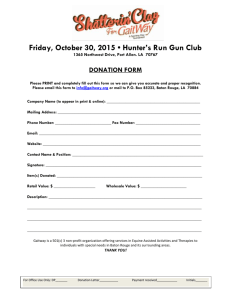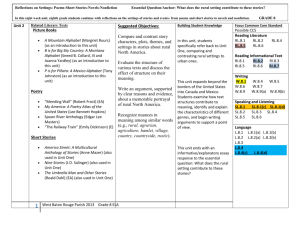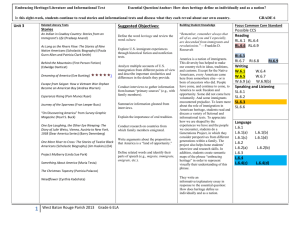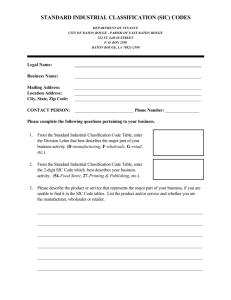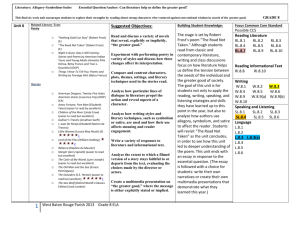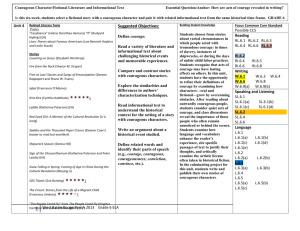CCSS Unit 3 Gr7 ELA DHenry
advertisement
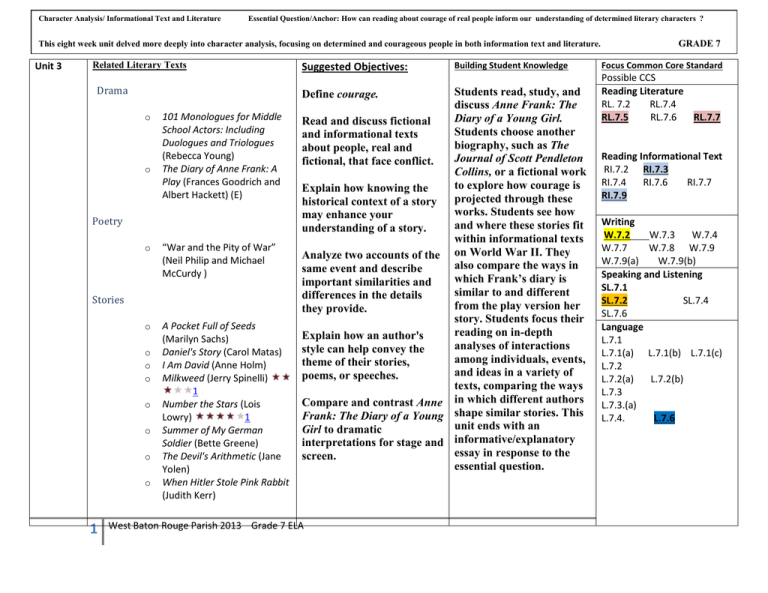
Character Analysis/ Informational Text and Literature Essential Question/Anchor: How can reading about courage of real people inform our understanding of determined literary characters ? This eight week unit delved more deeply into character analysis, focusing on determined and courageous people in both information text and literature. Unit 3 Related Literary Texts Drama o 101 Monologues for Middle School Actors: Including Duologues and Triologues (Rebecca Young) The Diary of Anne Frank: A Play (Frances Goodrich and Albert Hackett) (E) Poetry o “War and the Pity of War” (Neil Philip and Michael McCurdy ) o A Pocket Full of Seeds (Marilyn Sachs) Daniel's Story (Carol Matas) I Am David (Anne Holm) Milkweed (Jerry Spinelli) 1 Number the Stars (Lois Lowry) 1 Summer of My German Soldier (Bette Greene) The Devil's Arithmetic (Jane Yolen) When Hitler Stole Pink Rabbit (Judith Kerr) Stories o o o o o o o Building Student Knowledge Students read, study, and discuss Anne Frank: The Diary of a Young Girl. Read and discuss fictional Students choose another and informational texts biography, such as The about people, real and Journal of Scott Pendleton fictional, that face conflict. Collins, or a fictional work to explore how courage is Explain how knowing the projected through these historical context of a story works. Students see how may enhance your and where these stories fit understanding of a story. within informational texts Analyze two accounts of the on World War II. They also compare the ways in same event and describe which Frank’s diary is important similarities and similar to and different differences in the details from the play version her they provide. story. Students focus their reading on in-depth Explain how an author's analyses of interactions style can help convey the among individuals, events, theme of their stories, and ideas in a variety of poems, or speeches. texts, comparing the ways Compare and contrast Anne in which different authors Frank: The Diary of a Young shape similar stories. This unit ends with an Girl to dramatic interpretations for stage and informative/explanatory essay in response to the screen. essential question. Define courage. o 1 Suggested Objectives: West Baton Rouge Parish 2013 Grade 7 ELA GRADE 7 Focus Common Core Standard Possible CCS Reading Literature RL. 7.2 RL.7.4 RL.7.5 RL.7.6 RL.7.7 Reading Informational Text RI.7.2 RI.7.3 RI.7.4 RI.7.6 RI.7.7 RI.7.9 Writing W.7.2 W.7.3 W.7.4 W.7.7 W.7.8 W.7.9 W.7.9(a) W.7.9(b) Speaking and Listening SL.7.1 SL.7.2 SL.7.4 SL.7.6 Language L.7.1 L.7.1(a) L.7.1(b) L.7.1(c) L.7.2 L.7.2(a) L.7.2(b) L.7.3 L.7.3.(a) L.7.4. L.7.6 Note: This unit provides an example of how cross-curricular collaboration can naturally occur between English and other classes. Students can read informational text in history class and scientific texts in science class, and then compare those accounts to personal narratives and accounts about life during World War II read in English class. Much discussion can center upon the way background information enhances understanding of literature (for example, whether on World War II, the Nazis, or any other history or science topic of the teacher’s choosing). This unit also demonstrates how the reading and writing standards provide instructional connectivity between learning in English and other areas. Informational Texts Biographies Anne Frank: Beyond the Diary: A Photographic Remembrance (Ruud van der Rol and Rian Verhoeven) Anne Frank: The Diary of a Young Girl (Anne Frank) I Have Lived a Thousand Years: Growing Up in the Holocaust (Livia Bitton-Jackson) Night (Elie Wiesel) 2 The Journal of Scott Pendleton Collins: A World War II Soldier, Normandy, France, 1944 (Walter Dean Myers) Zlata’s Diary: A Child’s Life in Wartime Sarajevo (Zlata Filipovic) Memoirs A Friend Called Anne: One Girl’s Story of War, Peace, and a Unique Friendship with Annie Frank (Jacqueline van Maarsen) Children of Willesden Lane: Beyond the Kindertransport — A Memoir of Music, Love, and Survival (Mona Golabek) Four Perfect Pebbles (Lila Perl) Nonfiction 2 A History of US: War, Peace, and All that Jazz (Joy Hakim) (E) Atomic Structure and Chemical Reactions: Middle Grades and High School (Nevin Katz) Dear Miss Breed: True Stories of the Japanese American Incarceration During World War II and a Librarian Who Made a Difference (Joanne Oppenheim) Fighting For Honor: Japanese Americans and World War II (Michael L. Cooper) Ghost Soldiers: The Epic Account of World War II's Greatest Rescue Mission (Hampton Sides) (advanced) Hiroshima (John Hersey) Never to Forget: The Jews of the Holocaust (Milton Meltzer) Six Million Paper Clips: The Making of a Children’s Holocaust Memorial (Peter W. Schroeder and Dagmar Schroeder-Hildebrand) West Baton Rouge Parish 2013 Grade 7 ELA 1 The Making of the Atomic Bomb (Richard Rhodes) True Stories of D-Day (True Adventure Stories) (Henry Brook) Speeches “Blood, Toil, Tears and Sweat: Address to Parliament on May 13th, 1940” (Winston Churchill) (E) “Declaration of War on Japan” (Franklin D. Roosevelt) Art, Music and Media Media o o o o Unit 3: Terminology: Connotation Documentary Elliott Berlin and Joe Fab, dir., Paper Clips (HBO documentary) (2004) George Stevens, dir., The Diary of Anne Frank (Screenplay by Frances Goodrich and Albert Hackett) (1959) Peter Jones, dir., Bataan Rescue: The Most Daring Rescue Mission of World War II (PBS documentary) (2005) Robert Dornhelm, dir., Anne Frank, The Whole Story (2001) Denotation Dialogue Point of View Dialogue Screenplay Weeks 13-20 Grade 7 Unit 3 Informational Text and Literature/Character Analysis 3 West Baton Rouge Parish 2013 Grade 7 ELA Diction Standards for Unit 3 Reading Literature “I CAN” Statements RL.7.2 Determine central ideas or themes of a text and analyze their development; summarize the key supporting details and ideas. I can determine a theme or central idea of a text. I can analyze its development over the course of the text. RL.7.4 Interpret words and phrases as they are used in a text, including determining technical, connotative, and figurative meanings, and analyze how specific word choices shape meaning or tone. I can provide an objective summary of the text. I can determine the meaning of words and phrases as they are used in a text, including figurative and connotative meanings. I can analyze the impact of rhymes and other repetitions of sounds (e.g., alliteration) on a specific verse or stanza of a poem or section of a story or drama. FOCUS STANDARD RL.7.5 Analyze the structure of texts, including how specific sentences, paragraphs, and larger portions of the text (e.g., a section, chapter, scene, or stanza) relate to each other and the whole. FOCUS STANDARD RL.7.6 Assess how point of view or purpose shapes the content and style of a text. RL.7.7 Integrate and evaluate content presented in diverse media and formats, including visually and quantitatively, as well as in words. I can analyze how a drama’s or poem’s form or structure (e.g., soliloquy, sonnet) contributes to its meaning. I can analyze how an author develops and contrasts the points of view of different characters or narrators in a text. I can compare and contrast a written story, drama, or poem to its audio, filmed, staged, or multimedia version, analyzing the effects of techniques unique to each medium (e.g., lighting, sound, color, or camera focus and angles in a film). Reading Informational Text RI.7.2 Determine central ideas or themes of a text and analyze their development; summarize the key supporting details and ideas I can determine two or more central ideas in a text and analyze their development over the course of the text. I can provide an objective summary of the text. FOCUS STANDARD RI.7.3 Analyze how and why individuals, events, and ideas develop and interact 4 West Baton Rouge Parish 2013 Grade 7 ELA I can analyze the interactions between individuals, events, and ideas in a text (e.g., how ideas influence individuals or events, or how individuals over the course of a text. RI.7.4 Interpret words and phrases as they are used in a text, including determining technical, connotative, and figurative meanings, and analyze how specific word choices shape meaning or tone. RI.7.6 Assess how point of view or purpose shapes the content and style of a text. RI.7.7. Integrate and evaluate content presented in diverse media and formats, including visually and quantitatively, as well as in words. FOCUS STANDARD RI.7.9 Analyze how two or more texts address similar themes or topics in order to build knowledge or to compare the approaches the authors take. Writing FOCUS STNADARD W.7.2 Write informative/explanatory texts to examine and convey complex ideas and information clearly and accurately through the effective selection, organization, and analysis of content. influence ideas or events). I can determine the meaning of words and phrases as they are used in a text, including figurative, connotative, and technical meanings. I can analyze the impact of a specific word choice on meaning and tone. I can determine an author’s point of view or purpose in a text and analyze how the author distinguishes his or her position from that of others. I can compare and contrast a text to an audio, video, or multimedia version of the text, analyzing each medium’s portrayal of the subject (e.g., how the delivery of a speech affects the impact of the words). I can analyze how two or more authors writing about the same topic shape their presentations of key information by emphasizing different evidence or advancing different interpretations of facts. I can write informative/explanatory texts to examine a topic and convey ideas, concepts, and information through the selection, organization, and analysis of relevant content. I can introduce a topic clearly, previewing what is to follow; organize ideas, concepts, and information, using strategies such as definition, classification, comparison/contrast, and cause/effect; include formatting (e.g., headings), graphics (e.g., charts, tables), and multimedia when useful to aiding comprehension. I can develop the topic with relevant facts, definitions, concrete details, quotations, or other information and examples. I can use appropriate transitions to create cohesion and clarify the relationships among ideas and concepts. I can use precise language and domain-specific vocabulary to inform about or explain the topic. I can establish and maintain a formal style. 5 West Baton Rouge Parish 2013 Grade 7 ELA I can provide a concluding statement or section that follows from and supports the information or explanation presented. W.7.3 Write narratives to develop real or imagined experiences or events using effective technique, well-chosen details, and well-structured event sequ ences. I can write narratives to develop real or imagined experiences or events using effective technique, relevant descriptive details, and well-structured event sequences. I can engage and orient the reader by establishing a context and point of view and introducing a narrator and/or characters; organize an event sequence that unfolds naturally and logically. I can use narrative techniques, such as dialogue, pacing, and description, to develop experiences, events, and/or characters. I can use a variety of transition words, phrases, and clauses to convey sequence and signal shifts from one time frame or setting to another. I can use precise words and phrases, relevant descriptive details, and sensory language to capture the action and convey experiences and events. I can provide a conclusion that follows from and reflects on the narrated experiences or events. W.7.4 Produce clear and coherent writing in which the development, organization, and style are appropriate to task, purpose, and audience. I can produce clear and coherent writing in which the development, organization, and style are appropriate to task, purpose, and audience. W.7.7 Conduct short as well as more sustained research projects based on focused questions, demonstrating understanding of the subject under investigation. I can conduct short research projects to answer a question, drawing on several sources and generating additional related, focused questions for further research and investigation. W.7.8 Gather relevant information from multiple print and digital I can gather relevant information from multiple print and digital sources, assess the credibility and accuracy of each source, and integrate sources, using search terms effectively. the information while avoiding plagiarism. I can assess the credibility and accuracy of each source. 6 West Baton Rouge Parish 2013 Grade 7 ELA W.7.9 Draw evidence from literary or informational texts to support analysis, reflection, and research. I can quote or paraphrase the data and conclusions of others while avoiding plagiarism and following a standard format for citation. I can draw evidence from literary or informational texts to support analysis, reflection, and research. I can apply grade 7 Reading standards to literature (e.g., “Compare and contrast a fictional portrayal of a time, place, or character and a historical account of the same period as a means of understanding how authors of fiction use or alter history”). I can apply grade 7 Reading standards to literary nonfiction (e.g. “Trace and evaluate the argument and specific claims in a text, assessing whether the reasoning is sound and the evidence is relevant and sufficient to support the claims”). Speaking and Listening Sl.7.1 Prepare for and participate effectively in a range of conversations and collaborations with diverse partners, building on others ideas and expressing their own clearly and persuasively. I can engage effectively in a range of collaborative discussions (one-on-one, in groups, and teacher-led) with diverse partners on grade 7 topics, texts, and issues, building on others’ ideas and expressing their own clearly. I can come to discussions prepared, having read or researched material under study. I can explicitly draw on that preparation by referring to evidence on the topic, text, or issue to probe and reflect on ideas under discussion. I can follow rules for collegial discussions, track progress toward specific goals and deadlines, and define individual roles as needed. I can pose questions that elicit elaboration and respond to others’ questions and comments with relevant observations and ideas that bring the discussion back on topic as needed. I can acknowledge new information expressed by others and, when warranted, modify their own views. FOCUA STANDARD SL.7.2 Integrate and evaluate information presented in diverse media 7 West Baton Rouge Parish 2013 Grade 7 ELA I can analyze the main ideas and supporting details presented in diverse media and formats (e.g., visually, quantitatively, orally). and formats, including visually, quantitatively, and orally. SL.7.4 Present information, findings, and supporting evidence such that listeners can follow the line of reasoning and the organization, development, and style are appropriate to task, purpose, and audience. SL.7.6 Adapt speech to a variety of contexts and communicative tasks, demonstrating command of formal English when indicated or appropriate. Language L.7.1 Demonstrate command of the conventions of standard English grammar and usage when writing or speaking. I can explain how the ideas clarify a topic, text, or issue under study. I can present claims and findings, emphasizing salient points in a focused, coherent manner with pertinent descriptions, facts, details, and examples. I can use appropriate eye contact, adequate volume, and clear pronunciation I can adapt speech to a variety of contexts and tasks, demonstrating command of formal English when indicated or appropriate. I can demonstrate command of the conventions of standard English grammar and usage when writing or speaking. I can explain the function of phrases and clauses in general and their function in specific sentences. I can choose among simple, compound, complex, and compoundcomplex sentences to signal differing relationships among ideas. L.7.2 Demonstrate command of the conventions of standard English capitalization, punctuation, and spelling when writing. I can place phrases and clauses within a sentence, recognizing and correcting misplaced and dangling modifiers I can demonstrate command of the conventions of standard English capitalization, punctuation, and spelling when writing. I can use a comma to separate coordinate adjectives (e.g., It was a fascinating, enjoyable movie but not He wore an old[,] green shirt). I can spell correctly. L.7.3 Apply knowledge of language to understand how language functions in different contexts, to make effective choices for meaning or style, and to comprehend more fully when reading or listening I can apply knowledge of language to understand how language functions indifferent contexts, to make effective choices for meaning or style. I can comprehend more fully when reading or listening. 8 West Baton Rouge Parish 2013 Grade 7 ELA L.7.4. Determine or clarify the meaning of unknown and multiplemeaning words and phrases by using context clues, analyzing meaningful word parts, and consulting general and specialized reference materials, as appropriate I can determine or clarify the meaning of unknown and multiplemeaning words and phrases based on grade 7 reading and content, choosing flexibly from a range of strategies. I can use context (e.g., the overall meaning of a sentence or paragraph; a word’s position or function in a sentence) as a clue to the meaning of a word or phrase. I can use common, grade-appropriate Greek or Latin affixes and roots as clues to the meaning of a word (e.g., belligerent, bellicose, rebel). I can consult general and specialized reference materials (e.g., dictionaries, glossaries, thesauruses), both print and digital, to find the pronunciation of a word or determine or clarify its precise meaning or its part of speech. I can verify the preliminary determination of the meaning of a word or phrase (e.g., by checking the inferred meaning in context or in a dictionary). FOCUS STANDARD L.7.6 Acquire and use accurately a range of general academic and domain specific words and phrases sufficient for reading, writing, speaking, and listening at the college and career readiness level; demonstrate independence in gathering vocabulary knowledge when encountering an unknown term important to comprehension or expression 9 West Baton Rouge Parish 2013 Grade 7 ELA I can acquire and use accurately grade-appropriate general academic and domain-specific words and phrases. I can gather vocabulary knowledge when considering a word or phrase important to comprehension or expression


